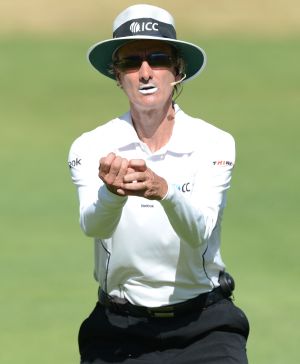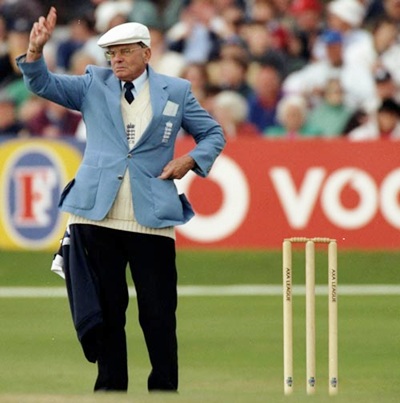In cricket, an umpire is a person who has the
authority to make decisions about events on the cricket field, according to the Laws
of Cricket. Besides making decisions about legality
of delivery, appeals for
wickets and general conduct of the game in a legal manner, the umpire also
keeps a record of the deliveries and announces the completion of an over. It
is a tough job. They need to stand in a position for the entire day. Some of the
best umpires are:
Simon
Taufel

Taufel stood in his first One Day International (ODI)
on 13 January 1999 in the match between Australia and Sri Lanka at Sydney when
he was 27 years old. He umpired his first Test match in December 2000 – the
Boxing Day Test between Australia and West Indies at Melbourne. He became a
member of the Emirates International Panel of ICC Umpires in 2002. He
was chosen to umpire at the 2003 Cricket World Cup. Famously,
he bagged five consecutive ICC Umpire of the Year awards between 2004 and 2008
for which people started considering him as one of cricket’s finest umpires.
Aleem Dar

He made his international
umpiring debut in an ODI between Pakistan and Sri Lanka at Gujranwala on 16 February 2000. In 2002 he became a member of ICC's International Panel of umpires. He was chosen to
umpire at the ICC Cricket World Cup in
early 2003. He was appointed to stand in his first Test
match in October 2003; the match between
Bangladesh and England at Dhaka.
Over the next six months he was appointed to stand in several more Test
matches, and as a neutral umpire in ODI matches away from Pakistan. At present, he is cricket’s most successful umpire.
He won three consecutive ICC Umpire of the Year awards in 2009, 2010 and 2011.
He had a brilliant World Cup 2011 as he gave 15 consecutive correct decisions
that won a battle against DRS challenge
Billy Bowden

In March 1995, he officiated
his first One Day International between New Zealand and Sri Lanka at Hamilton. In
March 2000 he was appointed his first Test match as an on-field umpire. Billy Bowden was drafted into the ICC Elite Umpires Panel
in the year 2003. Billy is best known for the unique and bizarre umpiring
signals that he undertakes, especially the dance jig that precedes his SIX”
signal and his crooked index finger to adjudge a batsman out.
Dickie Bird

He stood in his first county
game in 1970. Three years later, he officiated at his first Test match, England v New Zealand at Headingley in Leeds. In a 23-year-old career, Bird gained
immense appreciation from all quarters and was given a 'guard of honor' by the
Indian and England teams as he went out for one last time at Lord's in 1996.
Bird was awarded with the Member of the Order of British Empire (MBE) in 1986
and the Officer of the Order of British Empire (OBE) in 2012.
Steve Bucknor


Bucknor's first
international cricket fixture was a One
Day International (ODI) between the West
Indies and India at Antigua on 18 March 1989. His first Test
match was at Sabina Park, Kingston, Jamaica, between 28 April and 3 May 1989,
with the competing teams again being the West Indies and India. He comes with
181 ODIs under his belt and an exceptional amount of 128 test matches. He was
given the Order of Jamaica, Commander Class, in sports” for “superb services.
This well-known umpire declared his retirement in 2009.
